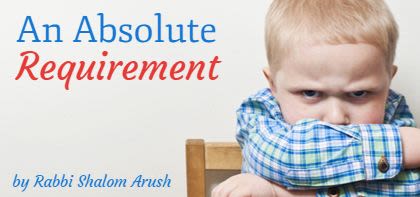
The Absolute Requirement
There is one absolute requirement in educating children, whether at home or in the classroom – without it, you have no hope of teaching the child anything…

There is an essential and critical element that every educator must know: In order to educate, you must absolutely and completely eliminate the character trait of anger! The minute that an educator gets angry with his pupil, he loses the power to educate that person. The educator must know that by losing control of himself, he also loses control over the child. On this, our Sages said that a controlling and exacting person (pakdan) cannot educate. A person who gets angry cannot teach, because his students cannot receive from him.
A teacher or parent who has to deal with a child’s misbehavior, lack of discipline or any other problem, must know that if he becomes angry, he will do the exact opposite of what he is trying to achieve. He wants to attain control and authority, but through anger, he loses it. When a child sees his parent lose control of himself, the child loses his respect for the parent, and the parent loses his authority. This is because anger highlights the parent’s weakness, and therefore, it is the exact opposite of education. The educator needs to be an exalted and stately figure that the child looks up to and adores, who has self-control and acts in a thoughtful manner.
The Downside of Anger
Understand that if I wanted to fully explain this point of how the educator loses his image as a proper educator, and all the spiritual effects of anger on a person, I could write an entire book on this subject alone. For instance, the Zohar says that a person who becomes angry loses his Divine soul. Instead, a dark-side force enters him. This is the deeper meaning of the teaching that when a person becomes angry, he loses his Divine image and he morphs into an animal. It is therefore no wonder that he cannot educate his own children, since even animals see in him an animal like themselves.
However, for the purposes of this book, I am going to focus only on how anger affects the image of the educator in the eyes of the student (or parent in the eyes of the child), since now the educator has no influence on the student. This is easily understandable. Take, for example, if you were told about a particular rabbi who could teach you wisdom and understanding. You go to visit that rabbi, only to discover that he becomes angry over the smallest stupidity like some fool. You certainly would not want to learn anything from that rabbi, and in your heart, you would scorn him.
This is exactly what happens to a child when his parent becomes angry. The child scorns such a parent, particularly when the parent clearly displays his weakness when he gets angry. For instance, if the parent tries to make the child feel bad for him: “Look what you have done to me, you’re causing me such grief! Don’t you have any mercy on me?” or if the parent labels the child as bad: “Look what you have done, you wicked child!”
Such behavior highlights the parent’s weakness, especially when the parent is going on and on in his rage, much more than the child can understand why. Then, the child thinks to himself, “What’s wrong with this father? He’s not normal! Why is he ranting and raving? What did I do that was so bad?” The child is sure that he is in the right, and he cannot understand the disproportionate and irrational reaction of the parent. He can’t understand the thoughts of an adult who is pressured and carries various burdens. The child is in his own childish world; he can’t imagine such levels of stress. The parent seems insane to the child, and he loses his esteem in the eyes of the child.
I Refuse to Get Angry
Therefore, every parent must make a firm resolution that they will never get angry at anything that the child does, no matter what!
This is for two reasons:
1. It is against the Torah to get angry, no matter what the situation.
There is absolutely NO situation in which the Torah permits someone to get angry – and child education is no exception!
It is forbidden to break a commandment of the Torah. No matter what the child does, it is never worth it to do something against Hashem’s will. It should be obvious to everyone that nothing good will ever come from doing something that is not in accordance with G-d’s will. Does it make sense then to sin and get angry, when it won’t have any positive effect? It doesn’t make any sense…
2. Parents want to educate their children in a way that works.
Ultimately, the goal of educating our children is to actually succeed in doing so! Since you can only succeed to teach the child something positive if you don’t get angry, since only then will you be calm and settled enough to find the right solutions to the situation at hand, and succeed in teaching the child correctly. You must know – the moment you get angry, you’ve lost any semblance of education. Therefore, you must decide that you will absolutely not get angry ever, under any circumstances, no matter what happens.













Tell us what you think!
Thank you for your comment!
It will be published after approval by the Editor.